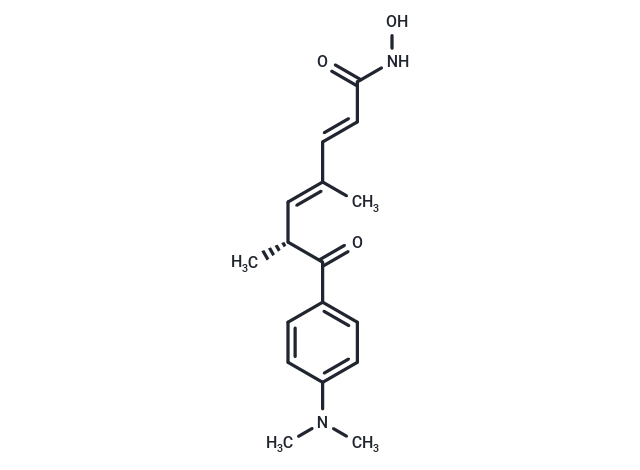Shopping Cart
- Remove All
 Your shopping cart is currently empty
Your shopping cart is currently empty

Trichostatin A (TSA), a natural derivative of diene isohydroxamic acids, is a specific and reversible histone deacetylase inhibitor (IC50=1.8 nM) that induces hyperacetylation of core histones to regulate chromatin structure.

| Pack Size | Price | Availability | Quantity |
|---|---|---|---|
| 1 mg | $86 | In Stock | |
| 2 mg | $112 | In Stock | |
| 5 mg | $197 | In Stock | |
| 10 mg | $373 | In Stock | |
| 25 mg | $522 | In Stock | |
| 50 mg | $755 | In Stock | |
| 1 mL x 10 mM (in DMSO) | $183 | In Stock |
| Description | Trichostatin A (TSA), a natural derivative of diene isohydroxamic acids, is a specific and reversible histone deacetylase inhibitor (IC50=1.8 nM) that induces hyperacetylation of core histones to regulate chromatin structure. |
| Targets&IC50 | HDAC:1.8 nM |
| In vitro | METHODS: Eight breast cancer cells MCF-7, T-47D, ZR-75-1, BT-474, MDA-MB-231, MDA-MB-453, CAL 51 and SK-BR-3 were treated with Trichostatin A (10-12 -10-5 M) for 96 h. The viability of the cells was determined by SRB. Cell viability was determined by SRB RESULTS: Trichostatin A inhibited the proliferation of eight breast cancer cell lines with a mean IC50=124.4±120.4 nM (range 26.4-308.1 nM). [1] METHODS: Esophageal squamous cell carcinoma cells EC9706 and EC1 were treated with Trichostatin A (0.3-1 μM) for 48 h. Apoptosis was detected using Flow Cytometry. RESULTS: There was no significant increase in the percentage of early apoptosis at 0.3 and 0.5 μM Trichostatin A doses. However, 1.0 μM Trichostatin A treatment significantly induced early apoptosis compared with control. In addition, the percentage of mid- and late-stage apoptosis increased in a concentration-dependent manner. [2] METHODS: Esophageal squamous cell carcinoma cells EC9706 and EC1 were treated with Trichostatin A (0.3-1 μM) for 60 min, and the expression levels of target proteins were detected using Western Blot. RESULTS: Trichostatin A decreased the protein levels of PI3K as well as p-Akt and p-ERK1/2 in a dose-dependent manner. acetylation of histone H4 was increased in a concentration-dependent manner. [2] |
| In vivo | METHODS: To assay antitumor activity in vivo, Trichostatin A (500 μg/kg) was injected subcutaneously into rats with NMU-induced mammary carcinoma tumors once daily for four weeks. RESULTS: Trichostatin A showed significant antitumor activity in vivo. tumors in Trichostatin A-treated rats had benign phenotypes, fibroadenomas or tubular adenomas, suggesting that the antitumor activity of Trichostatin A may be attributable to induction of differentiation. [1] METHODS: To assay antitumor activity in vivo, Trichostatin A (0.5-1 mg/kg twice weekly) and Quercetin (10 mg/kg three times weekly) were injected intraperitoneally into nude mice bearing human lung adenocarcinoma tumor A549 for thirteen weeks. RESULTS: High-dose Trichostatin A significantly inhibited tumor growth, while low-dose Trichostatin A and Quercetin alone had no effect. However, the combination of low-dose Trichostatin A and Quercetin significantly inhibited tumor growth. [3] |
| Kinase Assay | In vitro HDAC activity: Total cellular extracts are prepared from each breast cancer cell line (MCF-7, T-47D, ZR-75-1, BT-474, MDA-MB-231, MDA-MB-453, CAL 51, or SK-BR-3). A 20 μL crude cell extract (~2.5 ×105 cells), in the presence of varying concentrations of Trichostatin A in 0.1% (v/v) ethanol or 0.1% (v/v) ethanol as vehicle control, are incubated for 60 minutes at 25 °C with 1 μL (~1.5 × 106 cpm) of [3H]acetyl-labeled histone H4 peptide substrate (NH2-terminal residues 2-20) that has been acetylated with [3H]acetic acid, sodium salt (3.7 GBq/mmol) by an in vitro incorporation method. Each 200 μL reaction is quenched with 50 μL of 1 M HCl/0.16 M acetic acid and extracted with 600 μL of ethyl acetate, and released [3H]acetate is quantified by scintillation counting. IC50 values are determined graphically using nonlinear regression to fit inhibition data to the appropriate dose-response curve. |
| Cell Research | Cells are exposed to various concentrations of Trichostatin A for 96 hours. After treatment, cell proliferation is estimated using the sulforhodamine B colorimetric assay. Cell viability is determined by trypan blue exclusion. (Only for Reference) |
| Alias | TSA |
| Molecular Weight | 302.37 |
| Formula | C17H22N2O3 |
| Cas No. | 58880-19-6 |
| Smiles | C[C@H](\C=C(/C)\C=C\C(=O)NO)C(=O)c1ccc(cc1)N(C)C |
| Relative Density. | 1.139 g/cm3 |
| Storage | store at low temperature,store under nitrogen | Powder: -20°C for 3 years | In solvent: -80°C for 1 year | Shipping with blue ice. | ||||||||||||||||||||||||||||||||||||||||
| Solubility Information | DMSO: 50 mg/mL (165.36 mM), Sonication is recommended. Ethanol: 3 mg/mL (9.92 mM), Sonication is recommended. | ||||||||||||||||||||||||||||||||||||||||
Solution Preparation Table | |||||||||||||||||||||||||||||||||||||||||
Ethanol/DMSO
DMSO
| |||||||||||||||||||||||||||||||||||||||||

Copyright © 2015-2025 TargetMol Chemicals Inc. All Rights Reserved.